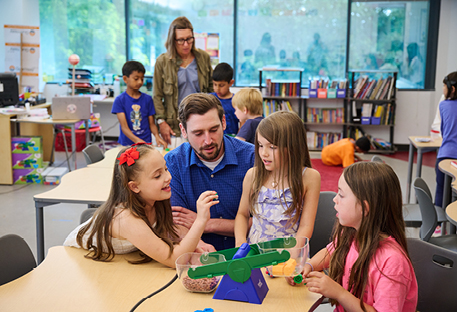Uncovering connections between subjects for advanced learning

Our Primary Program offers an unmatched learning experience for students as they begin to fully embrace a variety of subjects and their inter-connectivity. This program is uniquely defined by the emphasis on connections between subjects as well as the teaching partnership present in every class. Students have a different Subject Expert Teacher (SET) for every core class paired with a Learning Expert Teacher (LET) who shapes the learning environment as they move from each SET‘s classroom to another. Grade 5 students navigate the building and their classes on their own, learning from discipline-specific SETs for each class, using the independence and self-reliance fostered in grades 1–4.

A curriculum designed to inspire connections.
The unique curriculum of the Primary Program is rooted in the liberal arts and sciences and emphasizes connections between disciplines. As such, in grades 1–3, math and science are taught together and a humanities block covers topics from history, culture, civics, reading comprehension, and writing. Students also have a full schedule in the arts, with weekly 50 or 85-minute classes in fine arts, music, and performing arts. The curriculum helps students discover new ways of thinking and understanding the world around them through courses such as engineering and Mandarin. A weekly Connections course presents students with scenarios that require them to put their knowledge to work in new, unexpected ways in order to find a solution.
Grades 4 and 5, the Bridge Years, are years of transition from making connections in class to building the skills to make connections organically. Instead of the primary Math & Science course, students have separate classes for these disciplines. Similarly, English and history are also taught as distinct subjects, along with other courses.
Major concepts and skills within subjects are “spiraled,” or readdressed, throughout the grade levels with each re-introduction increasing in complexity and reinforcing what was previously learned.
An interdisciplinary opportunity to creatively put knowledge to work.
Connections, a weekly 50 or 85-minute class, presents students with creative challenges that test their mental agility, creativity, and content knowledge as they establish links across subjects and gain a deeper understanding of the material they are learning.
Aside from solving the problem at hand, students learn invaluable skills such as teamwork, hone their critical thinking skills, and are given the latitude to exercise great creativity.
In our Connections scenario with a Humanities theme, our Grade 1 students study Ancient Egypt including the development of agriculture and early societal structure, mythology, mummification and beliefs in the afterlife, pyramids, temples, and art and hieroglyphics. They are given the scenario that they are living in ancient Egypt. You must acquire goods by trading with merchants from other Egyptian cities. With the materials provided, students must create items they can use for trade. Ancient Egyptians used a barter system and students will do the same, exchanging their goods with students from other cities, and learning about economics in the process.
A two-teacher classroom to maximize student learning and growth.
Subject Expert Teachers (SETs) are experts in their content area, who share their experience and passion about a subject in every class.
Learning Expert Teachers (LETs) are skilled and experienced in the methods and practice of teaching for the primary grades. LETs are responsible for one classroom of students, all day, every day, and work with each Subject Expert Teacher, in each class period.
Together, these experts focus on building a school culture of social-emotional and academic support, and craft engaging, thought-provoking lessons. They also work to determine the best ways to deliver material, promote student engagement, and create an environment where students will best understand and retain what they learn in class. Their attention to students, team-oriented learning techniques, and focus on conceptual understanding helps students build confidence, stay motivated, and learn at an advanced pace.
At the beginning of each year, teachers issue a syllabus that includes an overview of the course and topics covered in their class. Beyond subject-specific goals centered on academic readiness for the next level, our Primary Program generally aims for students to be prepared and confident to move on to an advanced Middle School Program. In the Primary Program, our students:
- Learn to be comfortable asking questions, utilizing their creativity, engaging with others, sharing opinions, and expanding their problem-solving skills.
- Uncover connections between different subjects, forge an understanding that concepts outside the classroom do not exist in silos, and bridge content-rich coursework with critical enquiry and curiosity.
- Build important social and communication skills, as well as develop the ability to approach problems or challenges from multiple angles.
- Retain and improve knowledge as major topics are spiraled throughout every grade level to ensure mastery.

